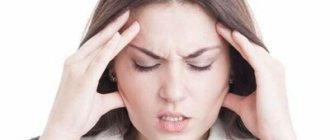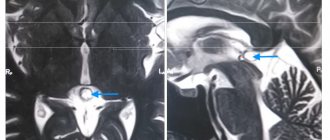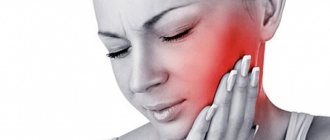Any competent doctor will tell you that you need to control your psycho-emotional state; if you can’t do it yourself, you can even be prescribed medications. Why is this so important? When stressed, the hormone cortisol is released. It affects the functioning of all body systems. Because of this, the functioning of the cardiovascular and nervous systems is disrupted, which can lead to deterioration in well-being, sleep problems, and problems with the gastrointestinal tract.
People who know how to cope with stress and avoid conflict situations tend to lead fulfilling lives. They have enough energy for work, friends and hobbies. Mentally balanced people have happy families, give birth to healthy children and raise them to be just as psychologically balanced.
The impact of stress on human health
Scientists have proven that the body of people who are constantly exposed to stress wears out 40% faster than those of those people who live in peace. Frequent stressful situations cause the following symptoms:
- Redness of the skin, various rashes;
- Feeling tired and exhausted even after a full sleep;
- Loss or gain of body weight;
- Constant feeling of anxiety;
- Tremor (shaking) of the limbs;
- Stool disorder.
If you do nothing, there is a high chance of developing the following pathological processes:
- Panic attacks;
- Depression;
- Heart failure;
- Stomach ulcer;
- Hypertension;
- Anorexia;
- Stress can also cause a decrease in sex drive in both women and men.
Why does stress become chronic?
It is difficult to name all the causes of chronic stress, since everything can be very individual and depend on the character and personality of the person, but most often this condition appears due to:
- traumatic events
- prolonged psycho-emotional overload,
- financial difficulties,
- everyday problems,
- family troubles,
- lack of proper sleep and rest,
- hormonal imbalances,
- genetic predisposition.
What does the doctor think?
“With chronic stress, the cardiovascular and nervous systems are among the first to suffer. Prolonged stress leads to neurosis and then to depression. The person becomes emotionally unstable.”
In any case, chronic stress requires treatment, so if you are now going through not the best times in your life for whatever reason, then it is worth watching yourself. You may already have become a hostage to stressful circumstances. And even if you don't feel that bad now, things could get much worse over time if nothing changes. You can earn yourself various diseases, including a heart attack, which you will have to deal with for many months, years, or even your whole life. Not to mention the fact that neuroses, panic attacks and clinical depression can be added to physiological problems.
Sleep as the basis for well-being
Adequate rest and healthy sleep are the first rules of a stable psyche. A well-rested person is more resistant to stress. The norm is considered to be 7-8 hours of sleep (and at least 9 hours if a person trains hard or works on his feet).
If there is not enough sleep, the stability of the nervous system decreases. You've probably observed how small children become capricious when they are tired and want to sleep. A similar condition is observed in adults who regularly do not get enough sleep - it becomes difficult for them to control their emotions, they feel irritation and aggression.
To improve the quality of your sleep, be sure to create a comfortable sleeping environment in your bedroom - darken the room, ventilate it before bed, and try to make the room quiet. Maintain a sleep schedule - try to go to bed and wake up at approximately the same time every day and not deviate too much from this schedule, even on weekends. If these measures do not help, contact a neurologist or somnologist. Your doctor will help you improve your sleep and quality of night's rest.
Causes of stress
Why does stress occur?
In fact, there are many reasons for the occurrence of a special condition. It is simply impossible to list everything.
Stress can be caused by:
- a banal move or conflict with the manager;
- illness (your own or a loved one’s);
- pregnancy, etc.
The risk of stress increases when:
- the presence of chronic pathologies of the nervous system;
- lack of sleep;
- unfriendly attitude of others;
- lack of support from loved ones.
Meditation and psychotherapy, their impact on health
Meditation is a great way to cope with depression and stress without medication.
The effect of meditation on the body is:
- Improving brain function. It has been scientifically proven that a course of meditation helps restore brain cells;
- Reducing the risk of developing heart disease;
- Eliminate feelings of anxiety;
- Developing mental resistance to stress;
- Increasing immunity and strengthening the body's defenses.
Scientists from Washington conducted an interesting study. 15 colleagues from one enterprise voluntarily took part in it. Before the rehabilitation course, each of the volunteers underwent a stress resistance test. It turned out that 14 out of 15 workers live in constant stress and cannot effectively cope with nerve-wracking situations.
The workers completed an eight-week meditation course under the supervision of a specialist - and a repeat test showed that the workers became much calmer and learned to control their emotions. Psychotherapy also shows good results - it helps solve problems and combat anxiety.
How to treat chronic stress?
Comprehensively. The important thing here is to start attacking stress from all sides.
- First, start getting enough sleep if you were constantly sleep-deprived before.
- Give yourself time to relax and enjoy your favorite hobby.
- Do yoga or breathing exercises.
- Go for a massage or sauna.
- Talk to positive people and don't watch the news (85% of it is negative).
All these measures are aimed at creating favorable conditions that will allow your body to recover and regain strength. To this list you can add any activity that brings you positive emotions, but not too strong.
As mentioned earlier, positive events that make you experience strong emotions are also stress. And in this case, in order to return to normal life, it is better to avoid any stress, both positive and negative, for some time. As they said in one famous film: “calm, only calm.” And then you won’t have to rack your brain for a long time on how to get rid of chronic stress. But if, no matter what you do, it doesn’t get better, you should seek professional help and undergo a course of therapy. A person can be in a stressful state for years and make unsuccessful attempts to get out of it on their own over and over again. The doctor will help you sort everything out much faster, and you can return to normal life without any consequences.
How to learn to control your psycho-emotional state?
How to maintain health and increase stress resistance?
- Don't take on several things at once. Complete every task you start without being distracted by extraneous factors. If your job does not allow you to do only one thing, make a schedule for the priority of tasks and, in the time allocated for a task, do only it.
- If you are nervous about a situation, ask yourself if there is something you can do. If not, then you need to come to terms with the fact that this situation and its result are beyond your control and try to distract yourself with something else. If you can, no need to worry, just do it.
- Try to develop independent self-esteem. Of course, listening to a negative assessment and scolding is unpleasant - but, if you think about it, this assessment has nothing to do with you. This is just the opinion of another person, which can be taken into account if the person is important to you, but should not be taken as an objective reality. Evaluate yourself.
- Set realistic goals for yourself. Not the easiest, but achievable. When determining the deadline for completing a task, reserve 15-20% of the time for force majeure situations and the human factor, then delays will not unsettle you.
- Light physical activity helps stabilize the psycho-emotional state - nothing calms you down like a light jog or swimming.
- Go to bed no later than 11 pm, try to sleep at least 8 hours.
- Organize your workplace in such a way that it is pleasant to be there and easy to find everything you need.
- Eat the right foods. For the stability of your psycho-emotional state, it is very important to eat a balanced diet. B vitamins are especially important.
- At least once a week, do something that makes you happy. Meet with friends, dance, eat delicious food, play computer or board games.
If nothing helps, and you feel that it is difficult for you to cope with stress on your own, contact a specialist; you may have depression. In this case, you need qualified treatment.
Treatment of stress in the clinic
At some point, our nervous system cannot stand it and higher nervous activity collapses.
This breakdown may be due to various reasons that weaken the nervous system and allow the disorder to take hold, which causes the manifestation of post-stress states.
Weakening of the nervous system can have a different nature and the causes can be due to both hereditary factors and those acquired during life (organic, toxic, infectious, etc.), as well as temporary (situational). These parameters are very significant when treating stress and treating post-stress conditions.
The clinic's specialists have extensive experience in treating stress and treating post-stress conditions, which cause disorders of the nervous system and are often very painful for people. Our doctors can correctly and safely restore the functioning of the nervous system without negative effects on the body.
Stress needs to be treated
The symptoms of stress disorders are very wide, both in variety and in strength of manifestations.
Are you going through a difficult period? Are you stressed? Or have you already gone through a difficult period, everything has improved, but your health is at zero? Have you been treated, but the treatment did not help or had a weak effect? Do not despair!
Call and make an appointment! Our treatment helps even with the most severe cases, when other treatments have not helped!
| Initial consultation and examination 2,500 | Therapeutic and restorative neurometabolic therapy from 5000 |
Does your child need help with stress?
The child has a conflict between his objective knowledge that going to the toilet is quite accessible and easy, and the distortion of upbringing due to his subjective attitudes. He has to make a decision: wait until the end of the lesson and admit that he is a weakling, or openly declare his need in front of the whole class. If he continues to rush between two decisions, psychological pressure arises.
Let's take another situation - an incurable disease. Ideally, in case of an incurable disease, the brain rearranges its activity to cope with the situation: it produces painkillers (pain, as a protective factor, is no longer needed by the body) and gradually prepares the body for dying, gradually turning off the body’s organs. Or he decides to fight for life at any cost, and then the body also begins to produce all the necessary healing factors for recovery.
But, it is necessary to remember that the child’s nervous system is not yet strong and large stress loads can upset the biological balance. That is why helping a child with stress is just as, or perhaps even more, necessary.
What happens during stress?
What actually happens, given the culture formed in a real society? In the first case, a terminally ill person (if he accepts the fact of a fatal illness) begins to blame the doctors and undeveloped technologies that missed diagnosing the disease at an early stage; a feeling of injustice arises towards himself: fate and God. He is sure that he could have lived longer if not for this injustice. This is where suffering comes from.
Now let's look at a patient with the second type of reaction - his own belief in recovery. Such a person begins to fight for his life, actively uses the discoveries of scientific medicine, alternative methods of treatment, and rebuilds his worldview in a new way. And then he faces resistance from society. Doctors stubbornly tell him about the final stage of the disease, his relatives are sorry, but refuse to help him, their own knowledge and descriptions of the disease in the literature also describe his immediate care. There is a conflict between one’s own needs and the knowledge of society. You need to have considerable fortitude to maintain balance and continue to fight until victory. More and more such stories are appearing in medical practice, literature and Internet sources.
A conservative, rigid person is more susceptible to stressful situations than a dynamic and flexible person. It is difficult for him to accept the fact of the new, and in his reality there is a gap between his world and the “world outside.” This refers to personal stress factors.
Possible stress factors
- Psychological (emotional, traumatic and informational)
- Physiological
- Short-term and chronic
- Eustress and Distress.
Emotional - associated with the experience of strong emotions. It does not matter whether these emotions are positive (eustress) or negative (distress). Help with this type of stress: leaving a stressful situation: you need time to let your emotions cool down and calm down.
Post-traumatic or, more correctly, post-traumatic stress disorder is a painful condition after experiencing a traumatic situation (tragic loss of loved ones, being in a war zone, disaster, rape, direct threat to life, etc.) Help for post-traumatic stress includes drug therapy, restorative procedures , in-depth psychological study of residual phenomena, training in self-regulation and relaxation, working with emotions.
Information is associated with factors of extreme impact of the educational process or professional activity (the so-called operator’s disease), when a person’s cognitive functions are overloaded with a large flow of new information. The first aid for information stress is to change the environment and type of activity: visit a museum, play sports. Equally important is the transition to independent work in the educational or production process, without outside control.
Physiological - manifests itself when a person is exposed to unfavorable physical factors: heat, cold, hunger, thirst. This can be seen in the example of fasting as a method of losing weight. Instead of the body using stored fat deposits, it blocks access to reserves. This is a response to an external stress factor. Such women complain about weight stabilization and the lack of weight loss effect from a starvation diet. At the same time, tension, irritability and emotional instability appear. The main help for stress associated with exposure to physical factors is to eliminate the factor itself. A change in attitude towards it, general strengthening procedures and the development of tolerance to physical external influences are required.











